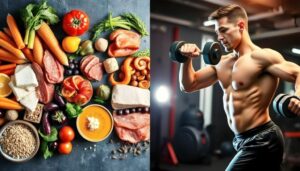Table of Contents
How to Eat to Gain Muscle: Comprehensive Guide
Introduction
Building muscle isn’t just about spending hours in the gym. The food you eat plays a critical role in shaping your body. Many individuals struggle to gain muscle due to improper nutrition and lack of a structured approach to eating. In this article, we will explore scientifically-backed methods, practical tips, and food suggestions to help you eat for muscle growth effectively.
The Importance of Nutrition in Muscle Building
Nutrition is the cornerstone of muscle growth. Without the right nutrients, even the best workout regimen can yield subpar results. Muscle growth requires a caloric surplus, adequate protein intake, and a balanced approach to macronutrients.
For example, studies from PubMed emphasize the role of protein and amino acids in promoting muscle protein synthesis, the process responsible for muscle growth.

How to Eat to Gain Muscle: Comprehensive Guide
Top Foods to Gain Muscle
1. Whole Eggs
Whole eggs are a powerhouse of nutrients, including high-quality protein and essential fats. They contain leucine, a key amino acid for muscle protein synthesis.
2. Lean Protein Sources
Chicken breast, turkey, and lean beef are excellent sources of clean protein. Aim for 5-8 ounces per meal to meet your daily protein requirements.
3. Fish Rich in Omega-3
Wild-caught salmon and tuna provide omega-3 fatty acids, which reduce inflammation and enhance recovery after intense workouts.
4. Complex Carbohydrates
Sweet potatoes, quinoa, and brown rice are excellent carbohydrate sources that provide sustained energy for your workouts.
Foods to Avoid
While focusing on nutrient-dense foods, it is equally important to avoid foods that hinder muscle growth. These include:
- Refined sugars: Increase inflammation and reduce recovery efficiency.
- Alcohol: Depletes essential nutrients and provides empty calories.
- Hydrogenated oils: Found in processed foods, these oils increase inflammation.
Supplements to Support Muscle Growth
1. Whey Protein
Whey protein is rapidly absorbed, making it ideal for pre- and post-workout nutrition. Choose grass-fed whey for better nutrient quality.
2. Branched-Chain Amino Acids (BCAAs)
BCAAs play a crucial role in muscle repair and growth. Studies from Healthline support their effectiveness in enhancing workout performance.
3. Creatine Monohydrate
Creatine increases strength and performance during high-intensity workouts. Stick to 1-3 grams daily for optimal results.
FAQs on Muscle Building Nutrition
How Much Protein Do You Need?
For muscle growth, aim for 1.6 to 2.2 grams of protein per kilogram of body weight. For example, a 70 kg individual should consume 112-154 grams of protein daily.
How Many Calories Are Required?
To build muscle, maintain a caloric surplus of 10-20%. Men generally need 2,800-3,200 calories/day, while women require 2,200-2,500 calories/day, depending on activity levels.
Tips for Eating to Gain Muscle
Prioritize Meal Timing
Spread your meals across the day to maintain a steady supply of nutrients to your muscles. Consuming protein-rich snacks every 3-4 hours can optimize muscle repair.
Stay Hydrated
Water is essential for muscle function and recovery. Aim for 2-3 liters per day, or more if you’re training intensely.
Leverage Pre- and Post-Workout Nutrition
A combination of protein and carbohydrates before and after workouts can significantly enhance muscle recovery and growth.
Additional Strategies for Faster Muscle Growth
Beyond nutrition, focus on these strategies to maximize muscle-building potential:
- Progressive Overload: Gradually increase the intensity of your workouts.
- Quality Sleep: Aim for 7-9 hours of sleep per night for optimal recovery.
- Consistency: Stick to your training and nutrition plans without interruption.